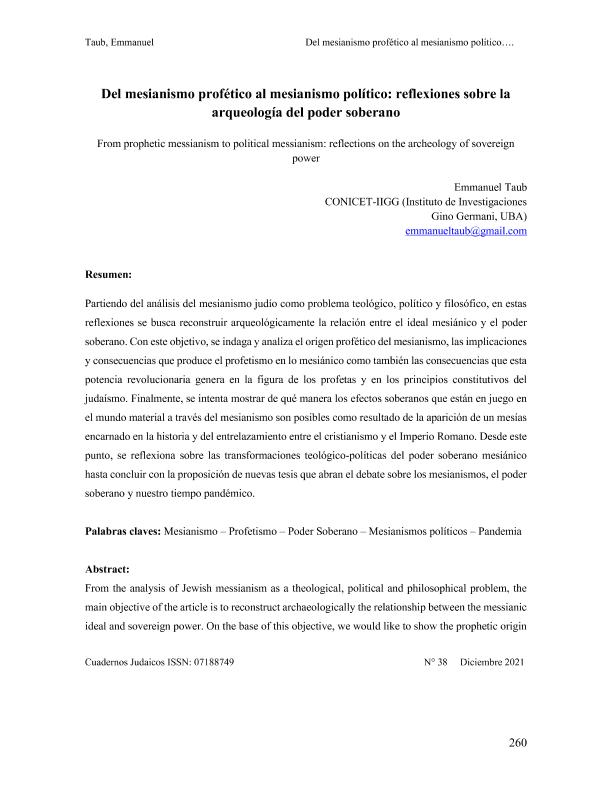Mostrar el registro sencillo del ítem
dc.contributor.author
Taub, Emmanuel

dc.date.available
2023-08-08T15:40:10Z
dc.date.issued
2021-07
dc.identifier.citation
Taub, Emmanuel; Del mesianismo profético al mesianismo político: reflexiones sobre la arqueología del poder soberano; Universidad de Chile. Facultad de Filosofía y Humanidades. Centro de Estudios Judaicos ; Cuadernos Judaicos; 38; 7-2021; 260-289
dc.identifier.issn
0718-8749
dc.identifier.uri
http://hdl.handle.net/11336/207394
dc.description.abstract
Partiendo del análisis del mesianismo judío como problema teológico, político y filosófico, en estas reflexiones se busca reconstruir arqueológicamente la relación entre el ideal mesiánico y el poder soberano. Con este objetivo, se indaga y analiza el origen profético del mesianismo, las implicaciones y consecuencias que produce el profetismo en lo mesiánico como también las consecuencias que esta potencia revolucionaria genera en la figura de los profetas y en los principios constitutivos del judaísmo. Finalmente, se intenta mostrar de qué manera los efectos soberanos que están en juego en el mundo material a través del mesianismo son posibles como resultado de la aparición de un mesías encarnado en la historia y del entrelazamiento entre el cristianismo y el Imperio Romano. Desde este punto, se reflexiona sobre las transformaciones teológico-políticas del poder soberano mesiánico hasta concluir con la proposición de nuevas tesis que abran el debate sobre los mesianismos, el poder soberano y nuestro tiempo pandémico.
dc.description.abstract
From the analysis of Jewish messianism as a theological, political and philosophical problem, the main objective of the article is to reconstruct archaeologically the relationship between the messianic ideal and sovereign power. On the base of this objective, we would like to show the prophetic origin of messianism and the consequences that prophetism produces in the messianic ideal. At the same time, we want to see the consequences that this revolutionary power generates in the figure of the Prophets and in the constitutive principles of Judaism. Finally, is necessary to analyze how the sovereign effects in the material world through messianism are possible as a result of the appearance of a Messiah in History and the intertwining between Christianity and the Roman Empire. From this point, our reflections focus in the theological-political transformations of the messianic sovereign power. The conclusion of the article is the proposition of new theses that wants to open the debate on messianism, sovereign power and our pandemic time.
dc.format
application/pdf
dc.language.iso
spa
dc.publisher
Universidad de Chile. Facultad de Filosofía y Humanidades. Centro de Estudios Judaicos
dc.rights
info:eu-repo/semantics/openAccess
dc.rights.uri
https://creativecommons.org/licenses/by-nc-sa/2.5/ar/
dc.subject
MESIANISMO
dc.subject
PROFETISMO
dc.subject
POLÍTICA
dc.subject
PANDEMIA
dc.subject.classification
Otras Ciencia Política

dc.subject.classification
Ciencia Política

dc.subject.classification
CIENCIAS SOCIALES

dc.title
Del mesianismo profético al mesianismo político: reflexiones sobre la arqueología del poder soberano
dc.title
From prophetic messianism to political messianism: reflections on the archeology of sovereign power
dc.type
info:eu-repo/semantics/article
dc.type
info:ar-repo/semantics/artículo
dc.type
info:eu-repo/semantics/publishedVersion
dc.date.updated
2023-08-08T13:06:02Z
dc.journal.number
38
dc.journal.pagination
260-289
dc.journal.pais
Chile

dc.journal.ciudad
Santiago de Chile
dc.description.fil
Fil: Taub, Emmanuel. Universidad de Buenos Aires. Facultad de Ciencias Sociales. Instituto de Investigaciones "Gino Germani"; Argentina. Consejo Nacional de Investigaciones Científicas y Técnicas; Argentina
dc.journal.title
Cuadernos Judaicos
dc.relation.alternativeid
info:eu-repo/semantics/altIdentifier/url/https://cuadernosjudaicos.uchile.cl/index.php/CJ/article/view/65787
dc.relation.alternativeid
info:eu-repo/semantics/altIdentifier/doi/http://dx.doi.org/10.5354/0718-8749.2021.65787
Archivos asociados
